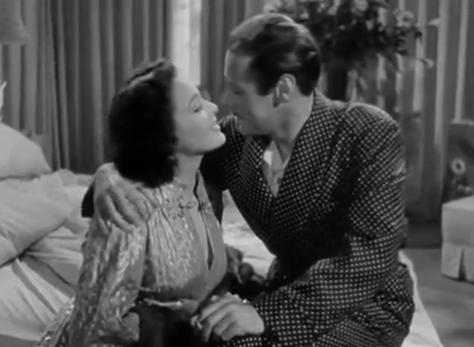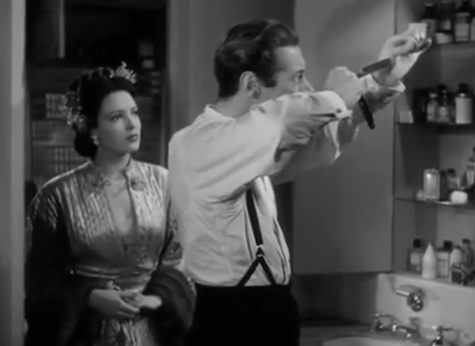
Though Preston Sturges would never eclipse the heights of the early 40s again and his stellar run was slowly spiraling down, we do have Unfaithfully Yours and for my money, that’s recompense enough.
It documents the life of a prestigious conductor, Sir Alfred De Carter (Rex Harrison), happily married to a gorgeous woman (a stunning Linda Darnell) with ample help from a staff including an efficient personal secretary (Kurt Kreuger) and a crotchety Russian played by Lionel Stander. The entourage includes his wife’s wisecracking little sister (Barbara Lawrence) and the sister’s husband, an insufferable bore of the bourgeoisie named August (“He’s got $100 million don’t also be expecting Mickey Mouse”).
The whole issue arises when said brother-in-law, played by Rudy Vallee, takes Alfred’s passing entreaty quite literally to “watch over his wife” while he’s away. As August was also away paying a visit to mother, he has a private detective check in on his sister-in-law. The P.I. collected a comprehensive dossier on her activities while he was gone, which Sir Alfred promptly rips up. It doesn’t help that the hotel house detective (Al Bridge) is very thorough in his job, driving the conductor to burn the documents decisively, followed by a valiant effort to put out the subsequent conflagration in his dressing room.
However, all his attempts are to no avail and the conductor starts getting ideas; the rumors that were in the back of his mind now start moving to the front, making him irritable.
What other film, featuring a tailor just trying to eat his lunch in peace, winds up leaving an impression because the man is given enough to say? It’s quintessential Sturges and he doesn’t disappoint many of his faithful players either. Each gets a spot of their own. The private detective (Edgar Kennedy) gets a contentious visit from De Carney and turns out to be a patron of the arts. He’s a keen follower of De Carney’s oeuvre even. Sturges gives him the perfect summation of his opinions, “For me, there’s no one who handles Handel like you handle Handel.”
There are also a few choice Sturges lines that I couldn’t help but recall being recycled from other pictures such as being “left to hang on a meat hook” and the age-old favorite “nuttier than a fruitcake.”
As the director slices through the material, De Carney thrusts and waves his way through Rossini, Wagner, and Tchaikovsky. He’s so attuned to his craft, in fact, that he daydreams through each, the music setting the perfect melody to each of his mental confrontations with his wife.

The first arrangement of events is calculated yet diabolical, played to a piece booming with sweeping, all-encompassing, passionate rage. Using a voice recorder, he stages the perfect murder to entrap the other man. He ends up cackling in the courtroom with relish as he watches Tony get his sentence. It’s all too easy. Hitchcock might have been proud.
His middle piece captures the pure melancholy of the entire scenario. Both maudlin and chivalrous, as he decides the greatest act of love he can perform is to let her go to her true love while writing her a check that she might never have to work her pretty hands ever again. The final coda picks up the tempo again in a ragingly melodramatic fashion that culminates in the proposition of Russian roulette between a gentleman and his rival.
What actually happens is like so: It entails an inexplicable trashing of his apartment after dipping out of his finest hour prematurely. Lamps and wicker chairs are systematically demolished, not to mention the knocking of the telephone off the line and unwittingly pranking the operator again and again. Glass shatters, pratfalls, miscues, clunking about like a witless neanderthal. It is all present.
There is a Georges Rouault painting up on a wall that I distinctly remember from an Art History textbook I once read. So, obviously, this makes this picture the height of culture and it might as well be. Juxtapose that with Rex Harrison, always so refined and erudite, seen stomping about and making a shambles of his apartment and you have one of the film’s high points. And the picture has much to offer us even amid its bleak and admittedly dark deviations.
What’s striking is not simply that this is a physical comedy (typical Sturges) but that it wholly relies on Rex Harrison’s abilities and is nearly a wordless sequence. For a man who was so renowned for his pen, Mr. Sturges shows an apt restraint. This long extended scene says in visual terms that the very way we envision things never hold a candle to actual reality, where things get complicated and muddled by this or that. Nothing is left where we remember it or sudden onslaughts of sneezing come out of nowhere.
Recording machines, that despite being “so simple they operate themselves,” never seem to behave properly, foiling us at every possible interval. In fact, each of his nefarious ploys that he dreams up get thwarted.

His wife comes home and they have a normal, healthy, human misunderstanding. Husbands get accidentally cut by razors, spill ink pots all over the desk, and wives innocently confuse the marginally different games of Russian Roulette and Russian Bank, worrying about the moods of said husbands.
The only flaw in Unfaithfully Yours, if we can call it that, is the fact that the husband has no open line of communication with his wife. Of course, not having it allows the film to cycle through each of its subsequent movements, thanks to our protagonist’s mercurial nature.
What I find most troubling about it is how he jumps too quickly to accusatory behavior in taking the higher moral ground. His better half is given the lower position as the doting wife, though her sincerity is never in question like his. I suppose it’s precisely why we must see Harrison acting like such a numbskull lunatic; we have a counterweight.
It’s true that the picture could have featured the pairings of Ronald Colman and Francis Ramden then James Mason and Gene Tierney at different intervals. Rex Harrison was brought on with Carole Landis to play his wife, only to have the actress replaced due to difficulties between her and Harrison. Landis is remembered today namely for her romantic ties to Harrison, her figure, and a terribly unfortunate, premature death.
It seems nearly impossible to separate the two as the picture’s release date was pushed back in part to the actresses death and her close romantic ties to Harrison (married to Lilli Palmer at the time). He was the last person to see her alive as well as one of the first people who discovered her body. While the parallels to this film aren’t altogether obvious, there’s nevertheless still some controversy swirling around both.
What we are left with is that Unfaithfully Yours is funny and then sad and then sadly funny again. We can’t laugh but we must just as life must be full of laughter. For it is one of the grandest antidotes for poison. The acerbic poison that crops up in people due to jealousy and distrust. The picture might be truer to life than we would care to admit. I’d generally be interested in hearing Rex Harrison’s thoughts. I guess we’ll never know. The viewing public in 1940s America certainly wasn’t ready for such a perversely pitch-black picture. It was probably too far ahead of its time. Even today it still maintains that sting of biting wit.
4/5 Stars
